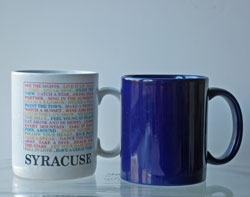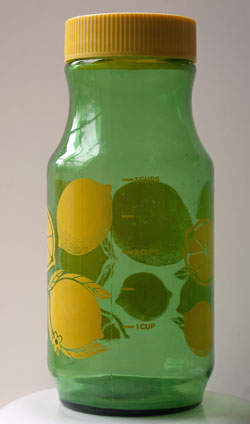Our household stuff
The simplest solution is to try not to acquire any more household stuff in the first place. This requires some vigilance.
Reduce
We're trying to possess only things we find very useful and that we enjoy. A few things, perhaps, such as a few pieces of artwork, don't have to be "useful," but most things should have some purpose.
Mugs: an example
 ©Janet Allen
©Janet Allen Both the same size and weight; the Syracuse mug stays, the plain blue one goes
Some things we enjoy are as simple as three or four of our mugs that are just the right size and shape with just the right heft that makes them enjoyable to use. They may not last forever, but we're moderately careful with them and they should last a good long time. We've somehow accumulated a number of other mugs and though we certainly need to have some extras for visitors, we don't need that many.
We went through our collection of mugs we somehow acquired over the years (generally from associations with some organizations or as gifts). We haven't broken many mugs over the years, so it amounted to quite a few. We pared our collection down to our favorites—about half of what we had—and gave the rest of them away. They'll serve someone else for a few years, leaving us with less-crowded cupboards.
Reuse
 ©Janet Allen
©Janet Allen Still going strong after 30 years
This jar's first use was a jar of lemon juice. But as a promotion, it included cup measure marks and was attractively decorated with lemons.
When the lemon juice was gone, we put it away to use "later." When we discovered it in the fruit cellar a few years ago, it seemed like the perfect thing to use to fill up with water to fill our large Brita and other occasions when we need water. It's just the right size and its narrow neck is easy to hold. We're still using it everyday.
This is just one of thousands of jars we've purchased that hold our food items. Why can't they all be reused?
Of course, this would require buying things from bulk sources, taking the jar to the store, and so on. A real dilemma since even the stores that have food in bulk don't want to be involved with weighing something you bring to the store. They just provide plastic bags.
Buying used
Buying things at a garage sale is a classic way of reusing stuff. It certainly is better than buying new things that required new resources to produce, but it's also tempting to buy more than what we need. We stopped going to garage sales a number of years ago, but it's certainly a helpful way for young families to acquire some things they need, reusing what other people no longer need. (Here's a case where our "reducing" becomes someone else's "reusing.")
Repurposing
Some things can be repurposed. For example, we found an old ladder put out to the curb, and it became a trellis for our beans.
Donations
One way we can foster reuse is to donate items to local charities. It's always troubling to see something set out in the garbage that someone else could use.
Recycle
Our county provides very good recycling services, but this generally is for household consumables, for example, food and drink containers.
Repair
Fortunately, John is rather handy and has been able to repair things that people otherwise would throw out.
His repair skills are also handy when we rescue items from the curb that have only minor problems.
Regret
This is one of the larger categories. Over the years, we've bought lots of things that turned out to be unnecessary or worthless. Sometimes they sounded like a great idea—something that would truly add value, but sometimes the purchases were adequately considered ahead of time.
Some of these items inevitably end up in the landfill. They obviously can't be "reduced" (except from our own house), no one else wants to "reuse" them, they can't be "recycled," and they can't be "repaired."
Something as simple as styrofoam cups could fall into this category, especially since mugs (reusable) or even paper cups (recyclable) could have been used instead.
